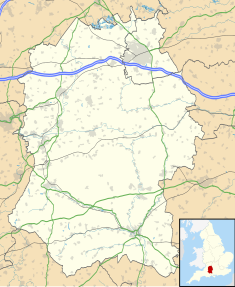Salisbury Guildhall is an 18th-century municipal building in the Market Place, Salisbury, England. The building, which is the meeting place of the Salisbury City Council,[1] is a Grade II* listed building.[2]
| Salisbury Guildhall | |
|---|---|
 | |
| Location | Salisbury, Wiltshire, England |
| Coordinates | 51°04′08″N 1°47′40″W / 51.0690°N 1.7945°W |
| Built | 1795 |
| Architect | Sir Robert Taylor and William Pilkington |
Listed Building – Grade II* | |
| Designated | 28 February 1952 |
| Reference no. | 1242739 |
History
editThe first guildhall, known as the "Bishop's Guildhall", was built on the initiative of the Bishop of Salisbury, Simon of Ghent, in around 1314.[3] It was so-called because this was the place where the bishop would exercise his feudal rights.[4] A second building, known as the "Council House" was built by the Merchants Guild to the north of the original building in 1585.[5] After the Council House was burnt down in a fire at a banquet, it was rebuilt, with a gift from Jacob Pleydell-Bouverie, 2nd Earl of Radnor, in 1780.[5]
In 1785 the bishop gave up his rights as clerk of the market and in return was released from his obligations to maintain the guildhall.[6] This enabled the old Bishop's Guildhall, which had become dilapidated, to be demolished.[7] The current building, which was designed by Sir Robert Taylor and William Pilkington, was built on the site of the former Bishop's Guildhall and completed in 1795.[2] The design involved a portico with Doric order columns with triglyph frieze above; tall arched windows were inserted on each side of the portico.[2] A grand jury room was added in 1829.[5]
In the 19th century, the judicial functions of the county were discharged at Devizes Assize Court in the summer and at Salisbury Guildhall in the lent.[8] There was a bomb explosion outside the guildhall in September 1884; according to the judge, the defendants had been "motivated by a mischievous desire to alarm the public".[9]
The building, which had been the meeting place of the municipal borough of Salisbury throughout much of the 20th century, became the headquarters of Salisbury District in 1974.[10] All magistrates' court hearings in Salisbury were held in the courtroom in the west wing of the guildhall.[11][12] Additional judicial facilities, to accommodate the crown and county courts, were established in Alexandra House in St John's Street in the mid-1980s.[13][14] Princess Diana visited the guildhall on 14 May 1991.[15]
After the abolition of the district in 2009, the guildhall became the meeting place of the newly created Salisbury City Council.[16] The Prince of Wales and the Duchess of Cornwall visited, in the aftermath of the Salisbury nerve agent attack, on 22 June 2018.[17]
Works of art in the guildhall include a portrait by John de Critz of James VI and I,[18] a portrait by Peter Lely of John Seymour, 4th Duke of Somerset[19] and a painting by George Cole depicting a view of Salisbury from Harnham Hill.[20] The Victoria Cross awarded to Lieutenant-Colonel Tom Adlam during the First World War is also on display in the guildhall.[21]
References
edit- ^ "Council Meetings". Salisbury City Council. Retrieved 17 March 2020.
- ^ a b c Historic England. "Guildhall, Salisbury (1242739)". National Heritage List for England. Retrieved 24 August 2019.
- ^ Crittall, Elizabeth (1962). "'Salisbury: The market place', in A History of the County of Wiltshire". London: British History Online. pp. 85–87. Retrieved 9 August 2020.
- ^ Nash, Sarah. "Salisbury Guildhall". Archaeology Travel. Retrieved 9 August 2020.
- ^ a b c "History". Salisbury Guildhall. Retrieved 9 August 2020.
- ^ Salisbury: Improvement Act 1785 c. 93
- ^ "'Plate 8: Old Views, Demolition of the Bishop's Guildhall', in Ancient and Historical Monuments in the City of Salisbury". London: British History Online. 1977. p. 8. Retrieved 24 August 2019.
- ^ "Wiltshire". Vision of Britain. Retrieved 10 August 2024.
- ^ "The History of Wiltshire Constabulary" (PDF). Wiltshire Police. p. 29. Retrieved 24 August 2019.
- ^ Local Government Act 1972. 1972 c.70. The Stationery Office Ltd. 1997. ISBN 0-10-547072-4.
- ^ "'Major Secular Buildings', in Ancient and Historical Monuments in the City of Salisbury". London: British History Online. 1977. pp. 46–59. Retrieved 6 March 2023.
- ^ "The Oak Court". Salisbury Guildhall. Retrieved 6 March 2023.
- ^ "Salisbury Combined Court Centre, Courts of Justice, Alexandra House, St John's Street, Salisbury, Wiltshire". National Archives. Retrieved 6 March 2023.
- ^ "Salisbury Guildhall (Coat of Arms)". House of Commons. 10 January 1990. Retrieved 6 March 2023.
- ^ La Vardera, Dee (2014). The Little Book of Wiltshire. The History Press. ISBN 9780750951937.
- ^ "Salisbury City Council". National Association of Local Authorities. Retrieved 9 August 2020.
- ^ "Royal boost for city following nerve agent attack almost four months ago". Spire FM. 22 June 2018. Retrieved 9 August 2020.
- ^ De Critz, John. "James I (1566–1625)". Art UK. Retrieved 9 August 2020.
- ^ Lely, Peter. "John Seymour (1628–1675), 4th Duke of Somerset". Art UK. Retrieved 9 August 2020.
- ^ Cole, George. "View of Salisbury from Harnham Hill, Wiltshire, with harvesters in the foreground". Art UK. Retrieved 9 August 2020.
- ^ "Tom Adlam VC". VC Online. Retrieved 9 August 2020.
